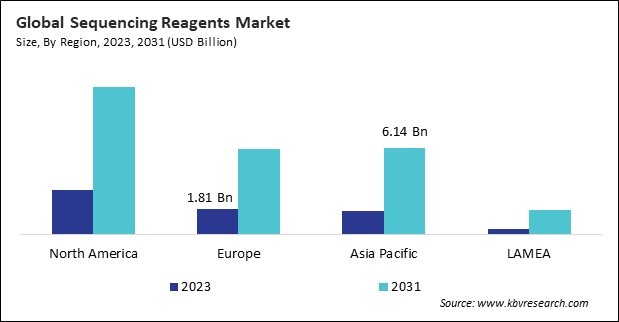According to a new report, published by KBV research, The Global Sequencing Reagents Market size is expected to reach $24.45 billion by 2031, rising at a market growth of 17.5% CAGR during the forecast period.
The Sequencing Kits segment is leading the Global Sequencing Reagents Market by Type in 2023; thereby, achieving a market value of $7.3 billion by 2031. Sequencing kits dominate the market because they facilitate high-throughput sequencing workflows across platforms like Illumina, Thermo Fisher Scientific, and Oxford Nanopore Technologies. Their adaptability to genomic applications, including whole-genome, exome, and transcriptome sequencing, ensures widespread usage in research and clinical settings. Continuous innovations in sequencing kits, such as improved accuracy, faster processing times, and compatibility with advanced sequencing technologies, further bolster their market demand.

The Reproductive Health segment is anticipating a CAGR of 16.5% during (2024 - 2031). This segment benefits from the rising adoption of sequencing technologies in applications like prenatal screening, carrier testing, and fertility assessments. Sequencing enables the early detection of genetic abnormalities and chromosomal disorders, offering critical insights for prospective parents and healthcare providers. Increased awareness of genetic risks, coupled with advancements in non-invasive prenatal testing (NIPT) and preimplantation genetic testing, is driving the demand for sequencing reagents in reproductive health.
The Next-Generation Sequencing segment is generating the maximum revenue in the Global Sequencing Reagents Market by Technology in 2023; thereby, achieving a market value of $19.2 billion by 2031. Next-generation sequencing (NGS) is driven by its ability to generate vast amounts of sequencing data rapidly and cost-effectively, revolutionizing fields like genomics, transcriptomics, and metagenomics. The technology's versatility in handling diverse applications, including whole-genome sequencing, cancer research, and personalized medicine, makes it the preferred choice for researchers and clinicians. Ongoing advancements in NGS platforms, such as improved accuracy and reduced costs, further bolster its dominance in the sequencing reagents market.
The Clinical Research segment is registering a CAGR of 16.4% during (2024 - 2031). Clinical research leverages sequencing technologies for their ability to detect genetic mutations, identify biomarkers, and advance precision medicine. The demand for sequencing reagents within this sector is propelled by their essential function in elucidating intricate diseases such as cancer and uncommon genetic disorders. Next-generation sequencing (NGS) advancements enable high-resolution genomic analysis, making them indispensable tools in clinical trials and diagnostics. The growing focus on personalized therapies further accelerates the adoption of sequencing reagents in clinical research.
Full Report: https://www.kbvresearch.com/sequencing-reagents-market/
The North America region dominated the Global Sequencing Reagents Market by Region in 2023, and would continue to be a dominant market till 2031; thereby, achieving a market value of $10.5 billion by 2031. The Europe region is experiencing a CAGR of 17% during (2024 - 2031). Additionally, The Asia Pacific region would exhibit a CAGR of 18.4% during (2024 - 2031).
By Type
By Technology
By Application
By End Use
 Unique Offerings
Unique Offerings